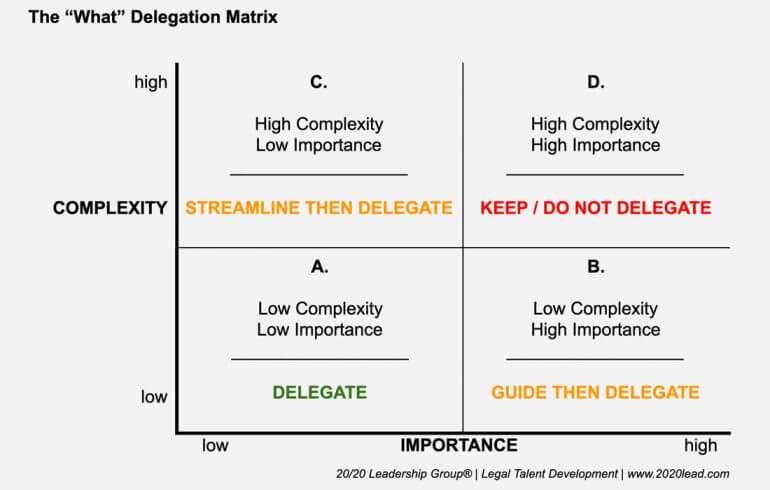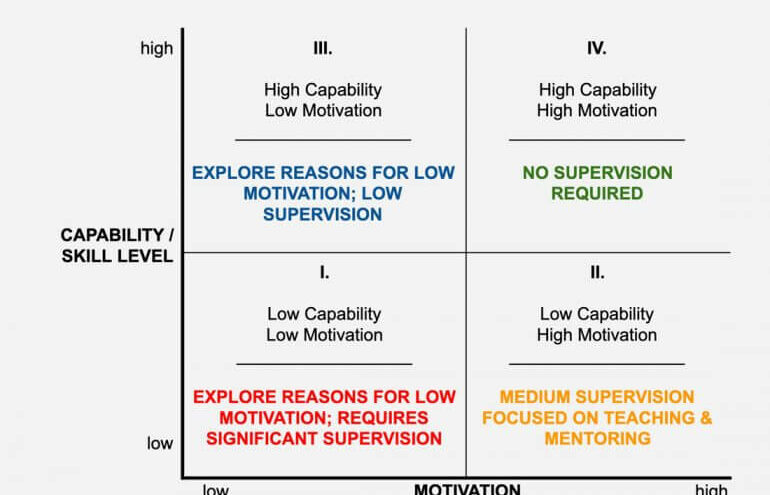There are three important steps to delegate legal work effectively: 1) Determine what, 2) Decide who, and 3) Get clear on how.

Table of contents
- Understanding Delegation
- Step 1. Determining What You Can Delegate Effectively
- Step 2. Deciding to Whom You’ll Delegate Among Team Members
- Step 3. Specifying How You Want the Work Done
- Overcoming Delegation Challenges
- Best Practices for Delegation
- Once You Learn to Delegate Tasks Effectively
- Frequently Asked Questions About Delegating Effectively
Julia is a star senior associate and soon-to-be partner. She knows that to continue succeeding at her firm, she needs to delegate more work to junior associates and staff. But how? She simply doesn’t think she can trust others to do a quality job. After all, her mantra “If you want anything done right, do it yourself!” has served her well. And the few times she has delegated work, she’s had to redo everything herself.
“What’s the point?” she argues. “Delegating is just going to cost me more time and money.”
Many lawyers have the same attitude when it comes to delegating work to others. But the truly successful lawyers overcome this and figure out how to delegate effectively. Why? Because they know that not delegating can result in:
- Eroded trust, low morale and disempowered team members.
- Diminished productivity for both their team members and the lawyer.
Understanding Delegation
Delegation is more than just assigning tasks; it’s a strategic process that involves entrusting responsibilities to team members to free up your time for high-priority tasks. Effective delegation requires a deep understanding of your team members’ strengths and weaknesses, identifying specific tasks that can be delegated, and providing clear instructions and resources to ensure successful completion. This critical skill is essential for project managers, leaders, and anyone looking to enhance their professional development.
When you delegate tasks, you’re not just offloading work; you’re empowering your team members to take ownership and responsibility. This empowerment can lead to increased productivity, improved morale, and a better work-life balance for everyone involved. However, delegation can be challenging, especially for new managers or leaders who may struggle with letting go of control or trusting their team members to complete tasks effectively. By mastering the art of delegation, you can create a more efficient and motivated team, ready to tackle tasks and achieve your goals.
When delegating legal work, there are three important steps in the delegation process:
- Determine what.
- Decide who.
- Get clear on how.

Step 1. Determining What You Can Delegate Effectively
Often, lawyers say they’d love to delegate more work but it’s just too complex or too important to be delegated. While there is plenty of both in any given legal matter, not everything is as complex and important as it might seem at first. The following “What” Delegation Matrix will help you analyze whether a particular piece of work can be delegated effectively.
Clearly defining the desired outcome is crucial when assessing tasks for delegation. This ensures that the person receiving the task understands what success looks like and can achieve the expected results.
Using the matrix, assess the work you are considering delegating based on:
- The work’s complexity, which means the level of difficulty and the experience required to produce a quality result.
- The work’s importance, which means the potential impact the work can have on the outcome of the case, the client, you or the firm.

Quadrant A: Low Complexity and Low Importance
This is a slam dunk! This work should be delegated.
Examples: Administrative tasks (such as organizing files, getting docket updates and so on); routine project management tasks; data gathering on the opposing party and their attorneys. (We are using litigation as an example, but the same reasoning applies to transactional practices.)
Quadrant B: Delegating by Low Complexity and High Importance
This type of work can be delegated effectively with an appropriate amount of guidance. The person receiving the delegated task needs clear instructions, context, and support to understand the importance of the task and the impact this work may have on the rest of the matter or project.
Examples: Drafting standard complaints and answers; routine answers to interrogatories or requests for admission; document review; performing more important project management tasks (creating and maintaining various tracking charts, client status update matrices, etc.); proofreading motions prior to filing.
Quadrant C: High Complexity and Low Importance
There may be a limited number of things you consider to be highly complex and lower in importance compared with other things. Nevertheless, even the most complex pieces of work can be broken down into less complex components or stages. Spend some time analyzing whether some aspects of the work can be broken down into less complex tasks that can be delegated to others. Yes, it will take time to do, but from a strategic perspective, it will be a high-impact activity and time well spent. (More on that later.)
Examples: Drafting the statement of facts and procedural history sections of the Memorandum of Points and Authorities.
Quadrant D: High Complexity and High Importance
This is the work you keep, assuming you already analyzed it to determine whether there are any components of it that are less complex or less important, which can be delegated.
Example: Developing a litigation defense strategy.
Now that you know what you are delegating, the next step is to determine to whom you should delegate the work.

Step 2. Deciding to Whom You’ll Delegate Among Team Members
As a general rule, you should delegate work to the available team member (junior associate, paralegal) with the appropriate billing rate who is available and competent to do the work. But since time is a critical resource for any lawyer, a key question to answer is how much supervision or support the person will require.
Additionally, consider the team member’s expressed interest in learning or improving certain skills when deciding to whom to delegate tasks. Aligning tasks with their interests can foster both growth and effective work delegation.
To that end, the “Who” Delegation Matrix below will help you determine the best person for the job. Here you are assessing the person to whom you are considering delegating the work based on:
- Their capabilities or skill level, which means the individual’s experience and ability to handle the task effectively and produce a quality result.
- Both their level of motivation and yours, which means the individual’s desire to handle the work and your desire to entrust the work to them.

Quadrant I: How to Delegate for Low Capability and Low Motivation
While someone who doesn’t possess the skill set or the interest in taking on the work can seem like a poor choice, this is often a signal that something more serious is going on. Use delegation as an opportunity to understand what might be affecting this person’s level of motivation and explore professional development needs. In other words, don’t let their current state prevent you from investing in developing their talent. Have an honest conversation with the associate or bring in your firm’s talent development professionals to help.
Quadrant II: How to Delegate for Low Capability and High Motivation
This individual is willing to take on the work and will most likely be eager to learn. Depending on how time-sensitive your assignment is, they might be a great candidate for delegation. It all depends on your level of motivation and willingness to invest time in guiding, coaching and supervising them. When deciding, keep in mind that the next time a similar task or project comes up, you’ll be able to delegate with confidence.
Quadrant III: High Capability and Low Motivation
With this individual, you have a chance to use your talent retention strategies! Anytime you see a capable, experienced lawyer feeling unmotivated or disengaged, you want to jump on the opportunity to uncover the reason for their current state. Perhaps they have too much to do and are feeling overwhelmed. Maybe something is going on outside of work, or they feel disconnected from their passion. Whatever the reason, don’t let their seemingly low motivation prevent you from getting them involved.
Alternatively, the individual could be the perfect candidate to train someone else. So think of someone in Quadrant II they can work with. This pairing uses their talent and saves you time. Again, consider engaging your talent development team to support you and the attorney.
Quadrant IV: High Capability and High Motivation
The person you’re considering is both capable of performing the task and quite willing to take it on. Plus, you most likely feel confident in entrusting the task to them. Therefore your level of motivation is high, too. Your job here is simple — delegate.

Step 3. Specifying How You Want the Work Done
Now that you are clear on what task you want to delegate and the person you are delegating it to, you are ready to delegate the work. And this is where most lawyers make mistakes. They rush through the process of explaining the task. Likewise, they fail to set clear deliverables or confirm expectations, or avoid holding others accountable.
Delegating effectively involves providing clear instructions and expectations, ensuring that the team understands the task and the desired outcome.
To delegate legal work like a pro, you want to assess several things first.
Overcoming Delegation Challenges
One of the biggest hurdles in the delegation process is overcoming the fear of losing control or trusting team members to complete tasks effectively. This fear can be mitigated by developing clear communication channels, setting explicit expectations, and providing ongoing support and guidance. Another common challenge is identifying which tasks to delegate. This requires a keen understanding of your team members’ strengths and weaknesses and recognizing tasks that are time-consuming, tedious, or outside your expertise.
To navigate these challenges, consider using the 6 T’s framework to decide which tasks to delegate:
- Tasks that can be delegated or outsourced: Identify tasks that others can handle without compromising quality.
- Tasks that can be automated: Use technology to automate repetitive tasks.
- Tasks that can be eliminated: Assess if certain tasks are necessary or if they can be removed altogether.
- Tasks that can be delegated to others: Look for tasks that can be handed off to team members.
- Tasks that can be done by others: Identify tasks that don’t require your specific expertise.
- Tasks that can be done by the manager: Reserve high-priority tasks that require your direct involvement.
By applying this framework, you can systematically identify tasks to delegate, freeing up your time to focus on high-priority tasks and enhancing overall productivity.
Best Practices for Delegation
To delegate tasks effectively, follow these best practices:
- Clearly communicate the task and expectations: Provide clear, concise instructions and ensure the team member understands what is expected. This clarity helps prevent misunderstandings and sets the stage for successful task completion.
- Provide necessary resources and support: Ensure the team member has the tools, training, and support needed to complete the task effectively. This might include access to specific software, documents, or additional training sessions.
- Set clear deadlines and check-in points: Establish a deadline and regular check-in points to monitor progress. This helps keep the task on track and allows for adjustments if needed.
- Empower team members to take ownership: Give team members the autonomy to make decisions and take ownership of the task. This empowerment fosters a sense of responsibility and can lead to higher quality work.
- Provide feedback and coaching: Offer constructive feedback and coaching to help team members improve their performance and develop their skills. This ongoing support is crucial for their professional growth.
- Monitor progress and adjust: Keep an eye on the task’s progress and be ready to make adjustments as needed. This flexibility ensures that the task is completed effectively and to a high standard.
By adhering to these best practices, you can delegate tasks effectively, freeing up your time to focus on high-priority tasks and achieving your goals and objectives. Effective delegation not only enhances your productivity but also contributes to the professional development of your team members, creating a more dynamic and capable team.
Provide Clear Guidance on How to Complete the Assignment Successfully with the Desired Outcome
To ensure that your delegation produces a high-quality product, answer the following questions:
- Is there sufficient time for this person to complete the work you are delegating?
- Are your instructions clear about what needs to be done? Have you clearly articulated those instructions and provided context and support for the delegated tasks?
- Have you given the delegatee a chance to ask questions? (Tip: If your team members are not asking questions, assess whether you have created an environment where they can ask questions without feeling “stupid” or intimidated.)
- Have you provided context to help the individual understand how this assignment fits into the large scheme and why it’s important? (Tip: This is a fantastic motivational tool.)
- What are the major stages to completing the work, if any?
- Do you want any progress reports? How frequently and in what format?
- Are there other people involved? Do they need to be kept updated?
- How do you want the result to be delivered? A fully drafted motion? A rough draft? In a document file? A spreadsheet? Email?
- Is the deadline clear? “As soon as possible” is too vague. “End of the week” is better, but still vague. “Thursday afternoon” is even better. “Thursday before 5 p.m.” is best.
A Note About Time
When it comes to delegating, it’s easy to fall into the trap of thinking “it’ll be much quicker if I just do it myself.” Though this may be so in the short term, in the long run, you are short-changing yourself.
Identifying time-consuming tasks that can be delegated is crucial to save time and improve efficiency.
Investing your time now to effectively delegate the work to others is a high-impact strategic activity that can save you time:
- It leaves you with fewer items to handle now, which can save time in the short term.
- More importantly, you are teaching and developing others, which will save a lot more time in the long run.
Once You Learn to Delegate Tasks Effectively
For many lawyers, delegation can seem like an impossible task. Using these steps will help you be more strategic and, thus, more effective. The end result: You will be able to free yourself up to tackle the most valuable work, thereby growing your practice, advancing your legal career, and developing others along the way.
Successful delegation not only enhances productivity but also fosters trust within a team, allowing managers to focus on overarching goals while enabling team members to develop their skills and contribute meaningfully to projects.
Happy (effective) delegating!
Frequently Asked Questions About Delegating Effectively
What does it mean to delegate effectively?
Delegating effectively is about more than just assigning tasks; it’s about empowering your team to take on responsibilities in a way that boosts both productivity and morale. It requires open communication, recognizing the unique strengths of each team member, and ensuring that tasks are completed with excellence.
How do you delegate in an effective manner?
To delegate effectively, start by clearly defining the task and what you hope to achieve. Choose the right person by considering their skills and enthusiasm. Give them the tools and guidance they need, set realistic deadlines, and offer feedback and support throughout the process. This approach not only gets the job done but also helps your team grow.
What are the five guidelines for effective delegation?
- Communicate the task and expectations clearly.
- Select the team member best suited for the task.
- Provide the necessary resources and support.
- Establish clear deadlines and regular check-ins.
- Offer feedback and monitor progress.
What are the 3 golden rules of delegation?
- Trust your team members and empower them to take ownership.
- Provide clear instructions and context for the task.
- Regularly check-in and offer constructive feedback.
How can delegation improve productivity?
Delegation improves productivity by freeing managers to focus on high-priority tasks. It empowers team members to take on responsibilities, enhancing their skills and contributing to the team’s overall success.
Why do some managers struggle with delegation?
Managers often struggle with delegation due to a fear of losing control, a lack of trust in their team, or the belief they can do it better themselves. Building trust, communicating clearly, and investing in team development can help overcome these hurdles.
For more insights on effective delegation and its impact in the legal field, check out these articles on Attorney at Work: Delegating to Junior Employees and Mastering Delegation in Legal Work: 7 Tips to Scale Your Practice. By addressing these frequently asked questions, the article helps readers understand the delegation process’s importance and how to implement it effectively in their professional lives.nd its importance and how to implement it effectively in their professional lives.
Photo by Brooke Lark on Unsplash
For more on honing your delegation skills …
- “Outsourcing Legal Research and Brief Writing” by Lisa Solomon
- “Outsourcing: When You Can’t Clone Yourself” by Kristin Tyler
- “Smart Growth: Tapping Into the Freelance Lawyer Ecosystem” by Dan Lear
- “Lawyers’ Struggle for Work-Life Balance: Running Your Business” by Dustin Cole
Subscribe to Attorney at Work
Get really good ideas every day for your law practice: Subscribe to the Daily Dispatch (it’s free).
















